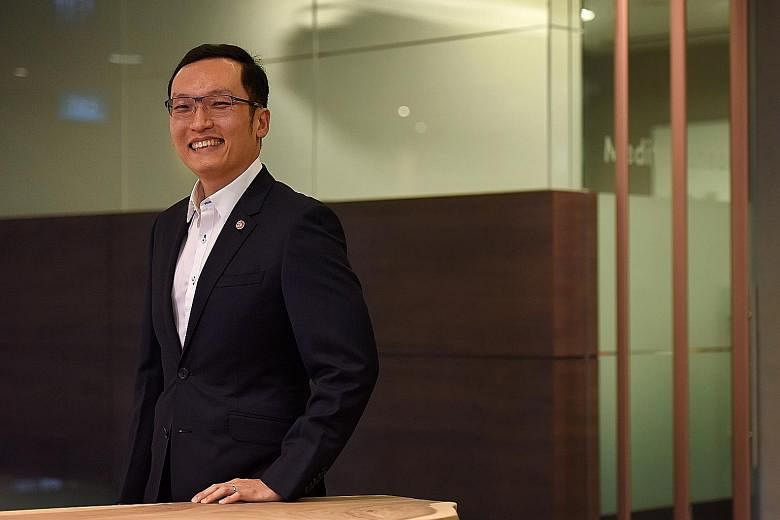It was a story about diapers and beer that sparked Mr Ken Wong's interest in data analytics, leading to a 19-year career as a data scientist.
Heading up the analytics department at OCBC Bank, Mr Wong mines and analyses millions of bytes of data for trends that could help drive business decisions.
"The satisfaction is really to be able to tell someone an insight about their business that they don't already know, using their own data," said Mr Wong, who joined the bank's group customer analytics and decisioning division six years ago.
It was exactly such insights that led the bank to roll out a youth banking solution, Frank by OCBC, in May 2011, targeting the youth and young working adults. Trawling through its customer segmentation data, the lender had discovered that it needed to do better in attracting young people to bank with OCBC.
The National University of Singapore (NUS) computer science graduate had ventured into the information technology area long before it became fashionable.
What got him fascinated about the vast potential of data was a story about a supermarket that made use of it to spur sales.
The store found, through data analysis, that American males, likely new fathers, who buy diapers also tend to purchase beer on Friday evenings as they are unable to meet their friends at the pub.
"What the supermarket did was put the two products side by side so it was easier for the buyers to pick up, and the sales just went up," Mr Wong said, recounting the story he heard from a professor when he did his master's in computer science at NUS.
Mr Wong and his team of 40 staff strive to do the same - drive higher efficiency or revenue growth - at the bank, providing their services across the OCBC group.
Their efforts have borne fruit, says the 42-year-old. More than 30 per cent of new sales in the consumer banking business is driven by data analytics.
Examples of applications include the launch of a credit card marketing engine, where to place ATMs, and home and renovation loan artificial intelligence-powered chatbot Emma. "Today, more than 10 per cent of those chat sessions (with Emma) eventually turn into sales prospects," he added.
How far data analytics is adding value to the company is also tracked and measured by what is called "shadow revenue" - which is the incremental revenue that his department brings to the business.
Mr Wong noted: "Every year, we see about 20 per cent growth in the amount of revenue we deliver. In the last financial year, we delivered more than $95 million worth of incremental revenue."
This means that without data analytics, the bank's revenue would have been $95 million poorer.
Shadow revenue is expected to hit more than $100 million this year as more business units within the group tap data to drive marketing campaigns or to improve processes.
Apart from engaging with customers, data analytics is also used in a human resources function, including the prediction on "flight risk" of its top-performing employees.
Mr Wong said: "We look for different patterns and data points of our employees... have they been attending training, have they been burnt out - looking at the number of e-mails they are receiving and sending out and the time they send them out."
The analysis is then sent to the human resources department, and should there be a risk that a staff member may leave the firm, the staff's supervisor would be directed to engage the individual to resolve any issues.
The pervasive use of data analytics in the firm means Mr Wong is always on the lookout for talent to grow his team, which has been much easier these days thanks to the buzz generated by tech giants such as Facebook and Google.
Singapore's push in Smart Nation initiatives has also helped to attract younger people to be more interested in artificial intelligence, coding and machine learning.
"I wouldn't consider myself a geek. A good data scientist needs to be multi-skilled, some of them are of course seen as geek-type of skills," Mr Wong said.
A good data scientist must be proficient in mathematics and handling data as well as programming and coding - dubbed geek skills - but the individual must also be able to translate numbers into insights and make recommendations to business heads.
Mr Wong added: "I am looking for the hacker mindset, the person must love problem-solving, and be able to apply curiosity to think of creative ways to solve a problem."
To put this to the test, job seekers would be asked questions like "How many Lego blocks are there in Singapore?" during the interview - with the intention to gauge the thought process behind the given answer.
OCBC Bank works with local universities such as the Singapore University of Technology and Design and the Singapore Management University to develop a talent pipeline and offers internships to promising students.
Financial services firms have been at the forefront of digital innovation, but more companies in other industries are expected to jump on the bandwagon as data analytics opens up opportunities to grow revenues, manage costs and improve efficiency.
"Data will become the new currency for all businesses," Mr Wong said.


